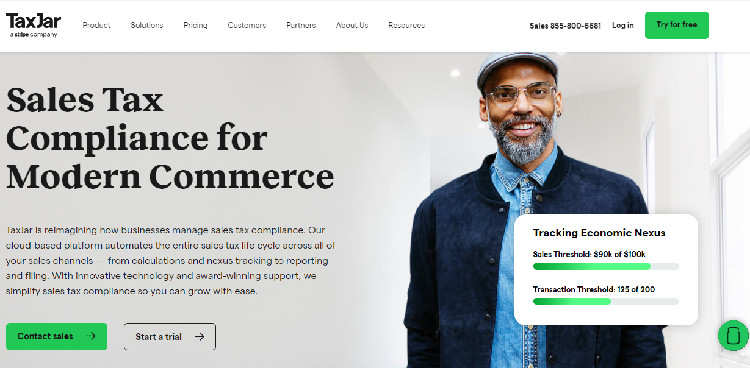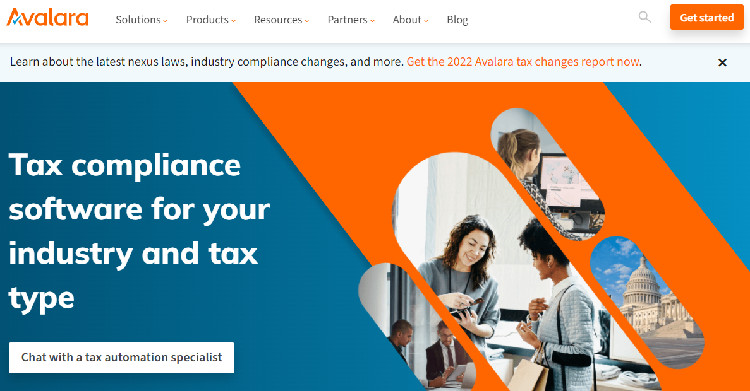- Bottom Line Up Front
- What is Ecommerce Sales Tax Software, and Why Do You Need It?
- The Benefits of Using Ecommerce Sales Tax Software
- How to Choose the Right Ecommerce Sales Tax Software for Your Business
- Features to Look for in an Ecommerce Sales Tax Software
- Top 5 Ecommerce Sales Tax Software to Consider
- How to Setup an Ecommerce Sales Tax Software for Your Business
- Tips for Staying Compliant with Ecommerce Sales Tax Laws
- FAQs
- Conclusion
Last Updated on December 4, 2023 by Ewen Finser
The basic rule for collecting sales tax is pretty simple: a business has to collect sales tax in any state with a physical presence or nexus. For most companies, this means collecting sales tax in any region or state where they have a physical store, an office, or a warehouse.
However, the definition of sales tax nexus becomes a little murky when talking about e-commerce sales because not all online businesses have a physical presence or nexus in every state. The U.S. Supreme Court in South Dakota vs Wayfair Inc. ruling back in June 2018, opened doors for states to collect taxes from out-of-state sellers.
This ruling brought about a complicated patchwork of state laws that proved challenging for businesses to navigate. For this reason, online sellers adopted eCommerce sales tax software programs to help them manage and comply with sales tax laws.
But the many e-commerce software programs available in the market make it difficult to decide which is the best one for your business. In this e-commerce sales tax software guide, you’ll learn the most important features to consider when comparing e-commerce sales tax software options.
Bottom Line Up Front
An e-commerce sales tax software is an important tool to help e-commerce sellers stay compliant with state sales tax laws. The right e-commerce sales tax software should fulfill all your basic needs, like automatically filing and remitting sales taxes.
It should also be simple and easy to use with all the features you need. To find the best e-commerce sales tax software for you, consider your company’s needs and review products that match your criteria.
What is Ecommerce Sales Tax Software, and Why Do You Need It?
An eCommerce sales tax software is a program that automatically calculates and collects sales tax on orders made by customers. Like brick-and-mortar companies have to collect and remit sales and use taxes for their physical presence, online businesses need to do the same for their virtual presence.
This automated process helps businesses determine the taxable status of customers in each applicable taxing jurisdiction. The software integrates seamlessly with eCommerce platforms such as Shopify and BigCommerce to minimize the time, effort, and resources you spend on sales tax compliance.
These software programs also provide users with a flat-rate or matrix method of calculating sales tax.
For example, some platforms use an algorithm that will calculate sales tax rates based on geographical location, while others offer a business owner a preset rate matrix to choose from. These tools handle all the data entry, calculations of local tax rates, and filings of sales tax returns.
The Benefits of Using Ecommerce Sales Tax Software
Ecommerce sales tax software guides you through the maze of local and state-specific rules and regulations. It ensures business data is collected accurately, which is crucial for keeping your company compliant with complex tax policies.
Below are other benefits of eCommerce sales tax software:
- Saves time and money by eliminating manual data entry, calculations, and filings.
- Automatically calculates the correct amount of sales taxes to collect based on your customer’s location and current rate laws in that region.
- Provides real-time alerts to stay updated with constantly changing sales tax laws.
- They come with up-to-date tax tables for each region to help you determine the correct sales tax amount.
- It helps businesses avoid penalties and fines by filing back taxes on time.
- Easily integrates with existing eCommerce platforms to automate the sales tax process.
How to Choose the Right Ecommerce Sales Tax Software for Your Business
There are thousands of eCommerce software providers, but not all these programs offer the same capabilities. You need a solution that’s flexible enough to accommodate your unique business needs while providing accurate sales tax calculations across all states.
When seeking out an eCommerce sales tax software provider, consider these criteria:
Value for Money
Consider the solution’s total cost and how it fits your budget. The best programs offer competitive pricing, and some even offer free trials or a money-back guarantee to help you determine if it suits your needs.
Customer Support
A reliable eCommerce software solution comes with an around-the-clock phone and email support if you run into issues. Most providers also offer extensive knowledge bases, webinars, or online tutorials to help you get started.
User Interface
The software’s dashboard or interface design should be intuitive and easy to navigate. Advanced features are only helpful if the user interface allows users to access them without extensive platform learning.
Flexibility
Look for a solution that’s flexible enough to integrate with your existing e-commerce platform easily. A good sales tax program has built-in connectors that eliminate manually importing and exporting data.
Ease of Use
A user should be able to switch from a manual sales tax method to a software program in a short amount of time. The best e-commerce platforms come with simple installation procedures and training sessions for new users or those not familiar with the platform.
Features to Look for in an Ecommerce Sales Tax Software
Before deciding on an eCommerce sales tax software, you should consider the following features:
1. Automated Tax Filing
Automated tax filings are essential because most eCommerce businesses are time-strapped. It’s not realistic for them to manually file sales tax returns each month with different state taxing authorities.
For this reason, an automatic filing feature is a top priority across all eCommerce sales tax software programs.
2. Support for Multiple States and Localities
To remain compliant with eCommerce sales tax laws, a software program should support filing taxes in all states and localities. The ideal program should handle local region-specific rate changes, exemption certificates, and product classification requirements.
3. Support for Multiple Business Types
Every business has a unique blend of products and services that drive its bottom line. For this reason, eCommerce software should support a range of business types and models.
These businesses include B2B services, drop shipping, digital products like online courses, and SaaS subscription services.
4. Streamlined Sales Tax (SST) Filing
Providing an easy user experience is a top priority across all eCommerce software programs. For this reason, look for a program that offers automated SST filing.
If your state requires any additional documentation, an SST filing service can upload these files automatically to the state authorities.
5. Analytics and On-Demand Reports
The best eCommerce sales tax software programs offer detailed reporting capabilities. These reports include analytics that tell you how much business you’re doing in each state and locality.
The software can also provide a range of custom reports to help you understand how different products and services impact your business’ bottom line.
6. Built-in Auto-Calculators
To simplify determining taxable status, look for an eCommerce sales tax software with built-in auto-calculators. These tools consider your business’ unique factors that affect taxability. Real-time rates and calculations also help you stay compliant with all state laws.
7. Support Multiple eCommerce Stores
You may have more than one eCommerce store for different businesses. An ideal eCommerce sales tax software supports the creation of unlimited stores, inventory details, and product prices.
This feature lets companies accurately allocate taxable rates for different products across all eCommerce platforms.
8. Up to Date Rates and Rules
Sales tax on eCommerce transactions changes frequently. The best eCommerce sales tax software should have real-time rates and rules updates to guarantee compliance with local laws.
You shouldn’t need to manually update or check for rate changes separately, as the software automatically does it.
9. Exemption Certificate Management
Exempt tax certificates are an essential part of eCommerce sales tax compliance. Without them, you could face steep penalties from state authorities. The best eCommerce sales tax software programs streamline this process by offering automated, template-based exemption certificates.
This feature allows you to quickly create and submit all necessary exemption certificates to state authorities.
10. Integrations with Other Systems
The best eCommerce sales tax software integrates seamlessly with other applications you use for your business. These integrations include accounting, ERP, and eCommerce platforms like Shopify.
Software programs should also integrate with payment processors like PayPal to process monthly payments automatically based on your company’s revenue data.
Top 5 Ecommerce Sales Tax Software to Consider
Below are some of the best eCommerce sales tax software programs to consider for your company.
1.TaxJar
TaxJar is a sales tax compliance tool for the modern seller. It’s a cloud-based sales tax engine that calculates sales tax for your eCommerce business in real-time. TaxJar helps track economic nexus across all your stores and provides you with an automated way to upload all the necessary forms for each state.
TaxJar links data from all linked accounts and CSV imports and displays your sales tax liability in your daily, weekly, or monthly TaxJar reports. It also automatically updates the information with state authorities every time you file a rate change for each chosen jurisdiction.
Its integration with top e-commerce platforms such as BigCommerce and Shopify makes it easy for you to manage tax rates and rules on your online stores. TaxJar also offers a single dashboard to help you understand how different products impact your total sales tax liability.
2. TaxCloud
TaxCloud stands out as a cloud-based sales tax solution for managing multi-state compliance across all your businesses and online storefronts. It has a detailed and robust dashboard that any business owner can understand. Users love TaxCloud for its customer service; the staff is dedicated to helping you resolve issues with your taxes and compliance information.
With TaxCloud, you can access all your important sales tax information from a single platform. It offers accurate rates and rules in real-time and automatically updates you on rate changes every time they happen. Its integrations with accounting and e-commerce platforms such as Shopify and BigCommerce also make it easier for companies to manage sales tax on multiple stores.
3. Avalara
Avalara is an all-in-one sales tax compliance solution for your business. It calculates sales tax rates accurately, based on your location and product category, then files them with the necessary state authorities for you. Avalara’s dashboard displays all vital information in one place, helping companies easily track their sales tax liability.
With more than 700 integrations, Avalara can work with all major e-commerce platforms and helps you manage sales tax on your online stores. It also works seamlessly with accounting software such as FreshBooks, QuickBooks, and Xero. You can quickly generate exemption certificates for each of your stores using Avalara’s automated system.
4. Taxify by Sovos
Avoiding tax gaps is easier with Taxify. First, it calculates accurate rates based on the products you sell and the location of each customer. Then, it automatically files tax returns to state authorities on your behalf, so you don’t have to spend time doing it yourself.
Taxify’s innovative technology enables businesses to file all their sales tax returns correctly and on time. It also helps you determine your total sales tax liability and how much you’d owe state authorities. This information is displayed in Taxify’s daily, weekly, or monthly reports to help track economic nexus across all stores.
5. WebGility
Webgility is among the few apps that offer the best tax management for online retailers. It integrates well, especially for businesses that use QuickBooks, NetSuite, and Xero. Webgility’s intuitive dashboard displays all your sales tax information in one place. You can also use it to maintain the products you sell, price items using alternate rules, and track inventory across all platforms.
Webgility guarantees 100% accuracy in sales tax calculations. It automatically submits all your sales tax returns for filing, so you don’t have to track income and expenses manually.
How to Setup an Ecommerce Sales Tax Software for Your Business
Once you’ve chosen an e-commerce sales tax software, you can start setting it up for your business. Ecommerce often involves different tax jurisdictions, so figuring out the rules for each state is important.
Follow these steps to set up e-commerce sales taxes:
- Identify products and services taxable under federal and state laws.
- Decide on a classification method for distinguishing between taxable and non-taxable products and services.
- Map product groups to the proper tax rule.
- Identify which products or services will be taxable or exempt from sales tax in each jurisdiction, considering any local laws.
- Decide on a rate structure for different categories of items
- Decide on how you will collect and report sales tax.
- Decide on a strategy for managing exemptions from taxation.
- If required, prepare the application programming interface (API) integration with your e-commerce platform or other software.
- Update all sites where products are sold to reflect changes in taxation rules and jurisdictions.
- Configure your shopping cart and accounting software (if required).
- Test and update as necessary.
- Implement the system.
- Maintain on an ongoing basis, such as assigning new tax rules or jurisdictions, amending existing ones, or changing rates for specific products or services.
Tips for Staying Compliant with Ecommerce Sales Tax Laws
Below are some tips for staying compliant with e-commerce sales tax laws:
- Establish your sales tax nexus so that you aren’t liable for collecting sales tax in jurisdictions where you don’t have a physical presence.
- Determine your state and local sales tax requirements and how they apply to online businesses, such as remote retailers that lack nexus in the state.
- Study if any states or localities are exempt from taxation items sold to certain entities, such as nonprofit organizations or government agencies.
- Make sure that your end customers are informed about the sales tax rules where they reside.
- Keep good records of all transactions if you need to provide proof of compliance later.
- Train your sales and customer service staff. For example, Colorado has training materials for sales tax compliance.
- Use e-commerce sales tax software to simplify the process of complying with sales tax laws, mainly if you operate in multiple states or have many customers.
FAQs
Question: How do I File Taxes with eCommerce?
Answer: The best way to file taxes related to eCommerce is by using e-commerce sales tax software. Some accounting firms and tax professionals can also help you meet your filing obligations. Tools such as Avalara AvaTax allow you to calculate the tax on your sale automatically.
Question: Does Shopify Automatically Calculate Tax?
Answer: Merchants can set up automatic tax calculations for Shopify. The platforms allow users to set overrides if needed, such as specific states or unique tax laws and situations. You can, however, integrate third-party sales tax apps for a detailed approach to compliance.
Question: Do I Need to Pay Taxes for My Online Store?
Answer: If you have an online business with a physical location, you must pay taxes for your online store. Failure to comply with eCommerce sales tax laws may result in heavy fines and other penalties.
Conclusion
Understanding the ins and outs of e-commerce software is crucial for merchants. If you don’t want to handle the process of sales tax compliance on your own, then e-commerce software can help you meet your filing obligations.
The above eCommerce sales tax software guide provides a high-level overview of e-commerce sales tax. Using the tips above, you can be sure to stay compliant with eCommerce sales tax laws.








